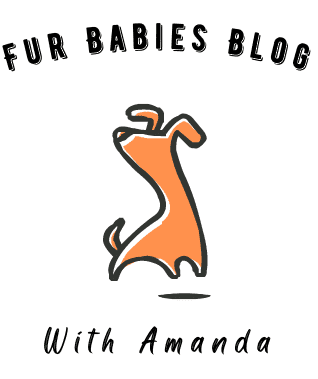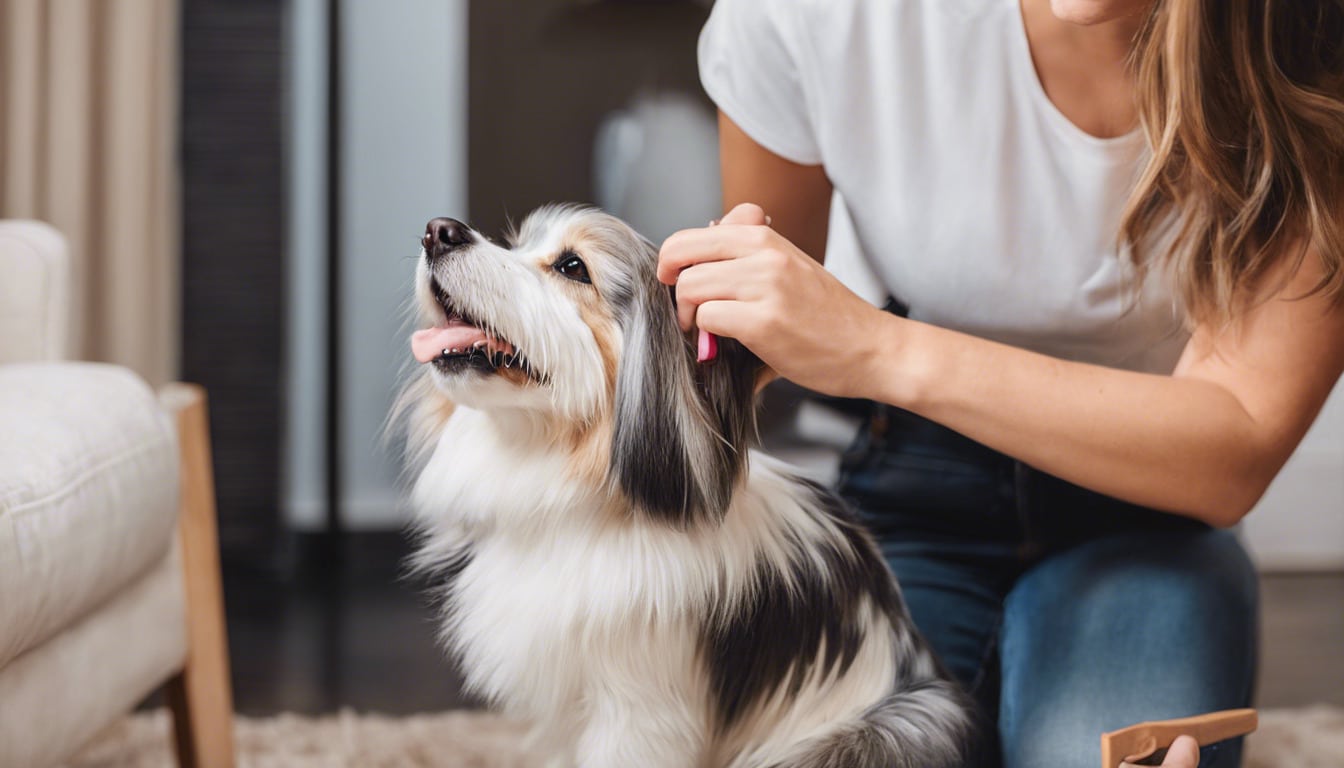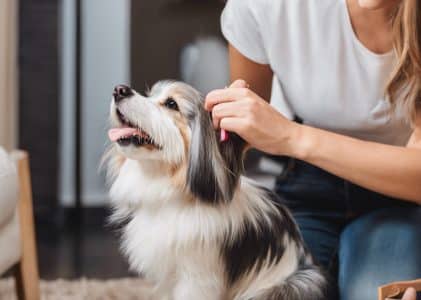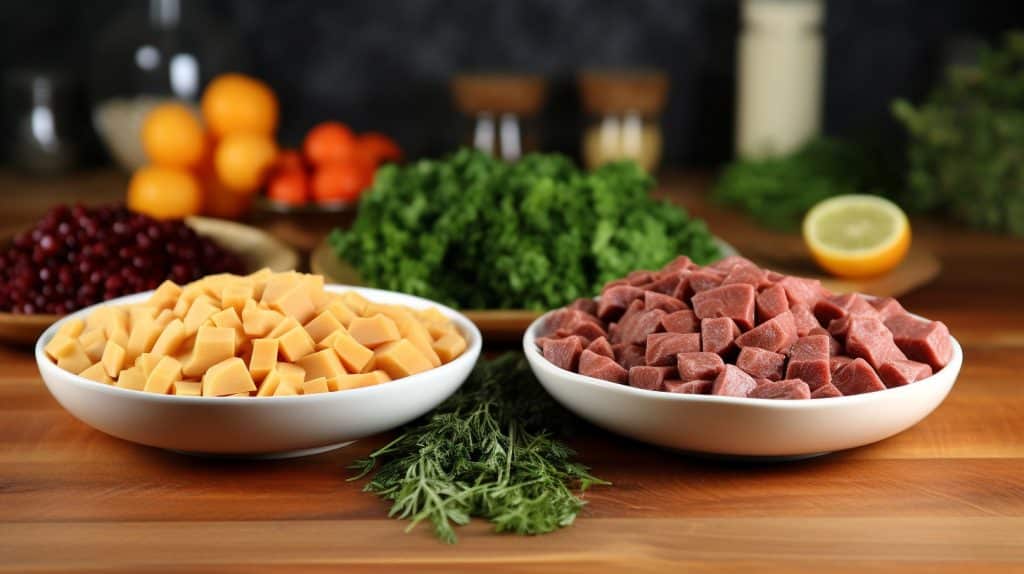What dog food helps with shedding? It's not that obvious to be fair….
You wake up one morning, look around, and it's as if a furry tornado swept through your house overnight. Your dog's shedding is out of control, and you're at a loss for what to do. But there is a solution at hand.
The key to managing your dog's shedding lies in their diet. Yes, that’s right – what you feed your furry friend plays a crucial role in how much fur they leave behind. So, let's examine the world of dog food and discover what dog food helps with shedding?
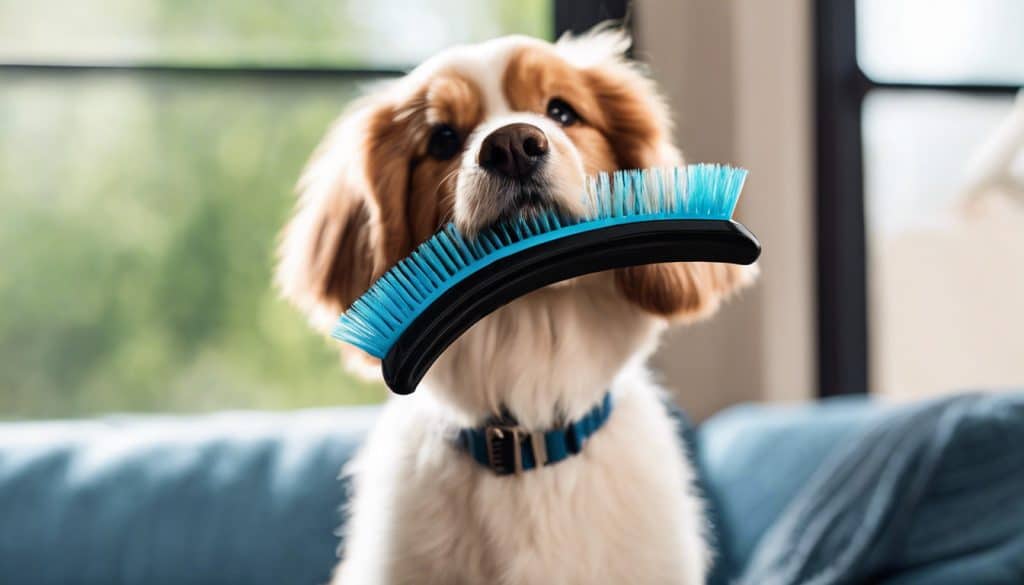
Key Takeaways:
- High-Quality Protein: Look for dog foods with lean protein sources like chicken, fish, or lamb to promote healthy hair growth and minimize shedding.
- Omega-3 Fatty Acids: Foods containing fish oil or flaxseed, rich in omega-3 fatty acids, can help maintain healthy skin and a shiny coat, reducing excessive shedding.
- Balanced Vitamins and Minerals: Ensure your dog's diet includes vital vitamins and minerals to support overall health, indirectly impacting shedding by preventing skin and coat issues.
Well, the secret lies in the food your pup devours! First up, we have the mighty High-Quality Protein. Seek out dog foods packed with lean protein sources such as chicken, fish, or lamb. These powerhouses provide the vital building blocks for strong, healthy hair that sheds less. Say goodbye to fur storms and hello to a sleek, shiny coat!
Next on the menu, we have the superstar Omega-3 Fatty Acids. Imagine a magical elixir that promotes healthy skin and a glossy coat – that's what omega-3 fatty acids bring to the table. Fish oil or flaxseed are your go-to ingredients here, helping your dog's skin stay supple and keeping shedding at bay.
Last but certainly not least, we have the Balanced Vitamins and Minerals squad. While they might not be the flashy stars of the show, these nutrients play a crucial role in maintaining your dog's overall health, which in turn influences shedding.
A well-rounded diet ensures your pup gets all the necessary goodies to keep their skin and coat in top-notch condition. So, there you have it guys. By incorporating these key ingredients into your dog's diet, you can help combat excessive shedding and keep your four-legged pal looking and feeling their best.
It's all about nourishing your furry companion from the inside out, creating a harmonious balance that leads to less fur chaos and more joy-filled moments with your beloved pup.
A soft and lustrous coat is something all pet owners want their dogs to have, as it is a great indication that your dog is happy and healthy. Shedding is a necessary part of achieving this goal and is a natural process for all dogs, despite differing greatly between breeds and individual dogs. Nevertheless, the mess caused by shedding can be a frustrating element of pet ownership.
https://wellbeloved.com
The Role of High-Quality Protein in Dog Food
Importance of Protein for Coat Health
There's something magical about the power of protein when it comes to your furry friend's coat. With the right balance of high-quality protein in their diet, you can help promote healthy hair growth and reduce excessive shedding.
Protein sources like chicken, fish, or lamb contain the vital building blocks your dog needs for a strong, shiny coat that won't leave a trail of fur tumbleweeds in its wake.
Identifying Quality Protein Sources in Dog Food
Protein plays a vital role in maintaining your dog's coat health, but not all protein sources are created equal. Sources like lean chicken, fish, or lamb are top-notch choices for promoting healthy hair growth and reducing shedding.
When scanning the ingredients list on your dog's food, look for these protein sources listed near the top to ensure your pup gets the best nutrients for a coat that's less likely to shed excessively.
The Benefits of Omega-3 Fatty Acids
Some dog foods packed with omega-3 fatty acids can do wonders for your furry friend's skin and coat. These superstar nutrients are like the secret weapon in the battle against excessive shedding. Omega-3 fatty acids, found in ingredients like fish oil or flaxseed, are known for promoting healthy skin and a shiny coat, reducing fluff storms in your home.
Effects on Skin and Coat
A vital nutrient like omega-3 fatty acids can work wonders for your pup's skin and coat. They help keep your dog's skin supple and healthy, reducing the likelihood of excessive shedding.
By including omega-3 fatty acids in your dog's diet, you're not only ensuring a sleek and shiny coat but also preventing those dreaded fur tumbleweeds from taking over your living space.
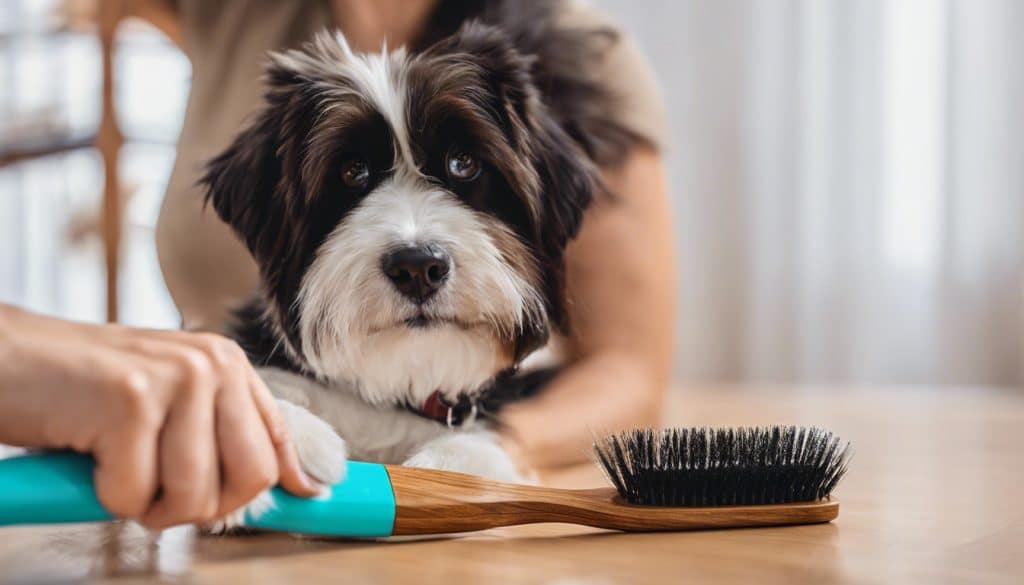
Finding the Right Balance in Dog Food
Acids such as omega-3 fatty acids play a crucial role in maintaining your dog's overall health, including their skin, coat, and shedding patterns.
In terms of selecting the right dog food, make sure to choose options that are rich in omega-3 fatty acids, along with high-quality protein sources like chicken or fish, to ensure a balanced diet that supports a healthy coat and minimizes shedding.
By finding the perfect balance in your dog's food, you're setting them up for success in the battle against excessive shedding.
Vitamins and Minerals for a Healthy Coat
Vitamins Essential for Skin and Fur
Despite shedding being a natural process in dogs, a balanced diet rich in vitamins can play a significant role in promoting a healthy coat and reducing excessive fur loss. Vitamins like Vitamin A, Vitamin E, and Biotin are imperative for maintaining skin and fur health.
Vitamin A supports cell growth and repair, Vitamin E acts as a powerful antioxidant that protects skin cells, and Biotin helps with the production of healthy skin and fur cells. Including these vitamins in your dog's diet can help keep their coat shiny and reduce shedding.
The Role of Minerals in Reducing Shedding
One key mineral that plays a vital role in reducing shedding is Zinc. Zinc is crucial for maintaining healthy skin and fur, as it helps with cell division, wound healing, and overall skin health.
A deficiency in Zinc can lead to dull coat, dry skin, and increased shedding. By ensuring your dog's diet includes adequate levels of Zinc, you can help minimize shedding and keep their coat healthy and lustrous.
Shedding is a normal part of a dog's life cycle, but by providing your furry friend with a balanced diet rich in imperative vitamins and minerals, you can help reduce excessive fur loss and promote a healthy coat.
Including high-quality protein, Omega-3 fatty acids, and a variety of vitamins and minerals in your dog's diet can make a significant difference in their shedding tendencies. So, next time you're shopping for dog food, keep an eye out for these key ingredients to ensure your pup's coat stays shiny, healthy, and shedding less.
Additional Tips and Considerations
Now, aside from diet, there are other factors that can help minimize shedding and keep your furry friend looking fabulous.

Regular Grooming and Its Benefits
The key to managing shedding is regular grooming. Brushing your dog's coat not only removes loose fur and prevents mats but also stimulates the skin and distributes natural oils, promoting a healthy coat. Plus, it's a great bonding experience between you and your pup!
When to Consult a veterinarian
To address excessive shedding, keeping an eye out for any additional signs such as skin irritation, bald patches, or changes in behavior is crucial.
If you notice these symptoms, it's imperative to consult a veterinarian. They can rule out any underlying health issues or allergies that may be contributing to the shedding. Perceiving any changes in your dog's shedding pattern is vital for their overall health and well-being.
This is where the expertise of a veterinarian comes into play. They can provide personalized advice and recommend the best course of action to address your dog's shedding concerns. Do not forget, your veterinarian is there to support you and your furry friend on their journey to a happier, healthier life.
Summing up
From above, we've learned that a balanced diet can help manage your furry friend's shedding. Look for dog foods with high-quality protein like chicken, fish, or lamb for healthy hair growth. Omega-3 fatty acids from sources like fish oil or flaxseed can promote a shiny coat and supple skin, reducing excessive shedding.
Ensure your dog's diet includes a variety of vitamins and minerals to support overall health, indirectly impacting shedding. Keep in mind, while diet is important, excessive shedding can also be a sign of allergies or health issues.
If you're concerned, consult your veterinarian for personalized advice. Prioritizing your pup's well-being through a balanced diet and proper care is key to a happy, healthy dog and a home with fewer fur tumbleweeds rolling by!
FAQs
Can changing dog food help with shedding?
Absolutely! What dog food helps with shedding can depend on the dog's individual needs but changing your dog's food to one with a high-quality main ingredient, balanced diet, and essential nutrients can promote healthier skin and coat, potentially reducing shedding.
Poor-quality dog food with artificial flavors and fillers may contribute to dry skin and hair loss, so selecting the right dog food can make a significant difference.
What is the best dog food for itching and shedding?
The best dog food for itching and shedding typically contains high-quality protein sources as the main ingredient, omega-3 and omega-6 fatty acids, and a balanced diet that supports your dog's skin and coat health. Look for dog food without artificial flavors or fillers, as these can sometimes exacerbate skin issues.
Each dog is unique, and the ideal dog food for a German Shepherd might differ from that of a Golden Retriever. Consult with your vet for personalized recommendations based on your dog's breed, size, and specific needs.
Best homemade dog food for shedding?
The best homemade dog food for shedding should contain a mix of high-quality protein, healthy fats, and essential nutrients to maintain your dog's skin and coat health. Ingredients like lean meats, fish, eggs, and vegetables can provide a balanced diet that supports your dog's overall well-being.
However, it's important to consult with your vet before switching to a homemade diet, as they can help you ensure its nutritionally complete and meets your dog's specific needs.
Can dog food make a difference in shedding?
Yes, dog food can make a difference in shedding. What dog food helps with shedding can vary from one dog to another, but a high-quality diet with the right balance of nutrients can support your dog's skin and coat health, potentially reducing shedding.
For some dogs, switching to a grain-free dog food might help, while others may benefit from a diet rich in omega-3 and omega-6 fatty acids. Consult with your vet to determine the best dog food for your furry friend's needs.
What should pet owners do if their dog is experiencing excessive shedding despite a good diet?
If your furry friend is shedding excessively, it's always a good idea to consult with your veterinarian. They can help rule out underlying health conditions or allergies that may be causing the issue and recommend a personalized dietary plan to address the shedding problem.
How do vitamins and minerals in dog food impact shedding?
While not directly linked to shedding, balanced vitamins and minerals in dog food can support overall skin and coat health. Ensuring your pup gets imperative nutrients can indirectly help prevent excessive shedding.
What types of dog food can help minimize shedding?
Dog foods with high-quality protein sources like chicken, fish, or lamb can promote healthy hair growth and reduce shedding. Look for options that also contain Omega-3 fatty acids from fish oil or flaxseed for a shiny coat.
Remember, while changing your dog's food can help with shedding, it's essential to consult with your vet for personalized recommendations and to rule out any underlying health issues that may be contributing to excessive shedding.
